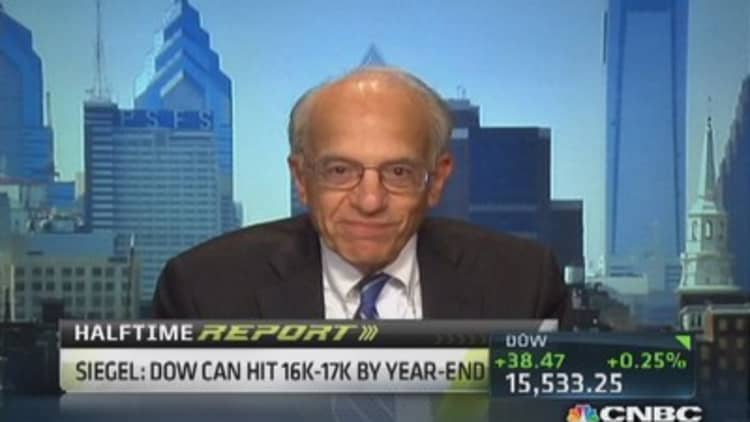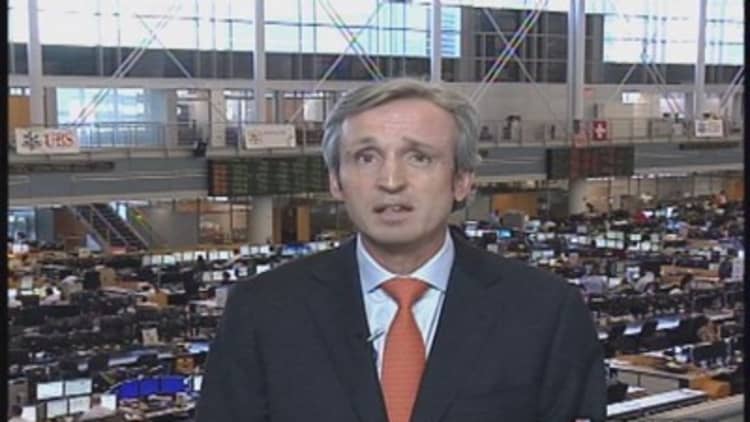
Still historically cheap, stocks stand to move higher after the Federal Reserve monetary policy uncertainty clears up this week, Jeremy Siegel of the Wharton School said Tuesday.
"We're one-half percentage point below the all-time highs in the S&P 500, in the , in the ," he said. "So, they're all just hovering there, I think, waiting for this uncertainty to clear up before moving higher."
(Read more: Time to start 'taper' rotation: Joe Terranova)
On CNBC's "Fast Money," Siegel said of the Fed's reduction of its $85 billion-per-month asset purchases, "$10 billion would be a good number" and that "$15 billion would be acceptable."
The Federal Open Market Committee, which convenes this week, is widely expected to reduce the amount of its $85 billion per month of asset purchases. The big question is by how much.
(Read more: Market expects $15 billion Fed taper soon: CNBC survey)
Siegel said that he expected the FOMC to announce a "softening" of inflation and unemployment rate targets necessary to further reduce its asset purchases.
"If they do $10 billion and we lower to 6 percent (unemployment rate), that's going to be a huge surge upward," he said. "If they don't mention any criteria at all, there's going to be some disappointment."

Siegel holds a 17,000 year-end target for the Dow Jones Industrial Average and expects the index to hit 18,000 next year.
(Read more: Jeremy Siegel predicts Dow 18,000 in 2014)
Stock prices would rise as uncertainty ebbed, he added.
"I think the tide is coming in for (Janet) Yellin, which is favorable for the market," Siegel said. "That uncertainty is being resolved. Syria is being resolved. The only thing left, really, is the debt ceiling."
Siegel also said that stocks were still cheap, priced on average at 15 to 16 times forward earnings.
"Relative to interest rates, the gap between stocks and bonds is still very, very large. What we economists call the equity premium is still very, very large," he said. "I mean, interest rates would have to go up an awful lot to get interest rates back to average. And when we see interest rates this low, P/E ratios have tended to be above 15-16 — 18 and 19, and that's why I think there's still some juice left in this market.
"That means that stocks relative to bonds are still cheap, even though relative to history are about average."
— By CNBC's Bruno J. Navarro. Follow him on Twitter @Bruno_J_Navarro.
— CNBC's Katie Young contributed research to this report. Follow her on Twitter: @katiecnbc.
Trader disclosure: On Sept. 17, 2013, the following stocks and commodities mentioned or intended to be mentioned on CNBC's "Fast Money" were owned by the "Fast Money" traders: Joe Terranova is long VRTS; Joe Terranova is long MS; Joe Terranova is long GS; Joe Terranova is long OXY; Joe Terranova is long HOS; Joe Terranova is long HAL; Joe Terranova is long APC; Joe Terranova is long LTD; Joe Terranova is long SBUX; Joe Terranova is short XBI; Josh Brown is long AAPL; Simon Baker is long AAPL ; Simon Baker is long BAC; Simon Baker is long C; Simon Baker is long GS; Simon Baker is long JPM; Simon Baker is long WFC; Simon Baker is long SBX; Simon Baker is long FB; Simon Baker is long AMZN; Simon Baker is long EEM; Simon Baker is long GM; Simon Baker is long P; As of 9/12 Jon Najarian is long AAPL; Jon Najarian is long FB; Jon Najarian is long MSFT; Jon Najarian is long LULU; Jon Najarian is long GRPN; Jon Najarian is long P; Jon Najarian is long ORLY; Jon Najarian is long SYK; Jon Najarian is long MGM; Jon Najarian is long WYNN; Jon Najarian is long MAR; Jon Najarian is long CERN; Jon Najarian is long COP; Jon Najarian is long FIO; Jon Najarian is long GPS.


